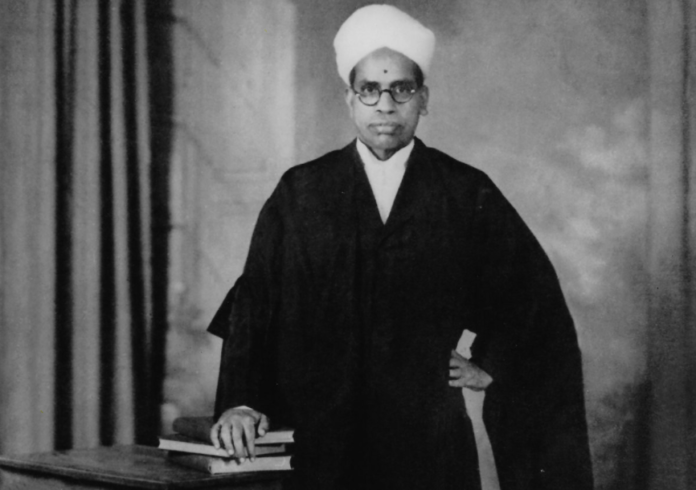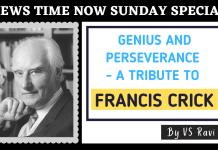On the occasion of 67th death anniversary of his grandfather, Sir Alladi Krishnaswami Iyer, his grandson V.S Ravi recalls unforgettable memories of his association with him and incidentally throws light on his life and times.
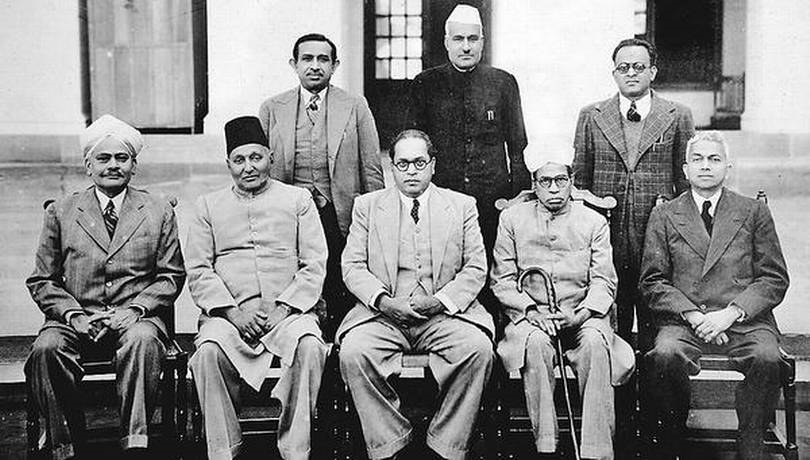
My grandfather hailed from an obscure and small community called the” Pudur Dravidas”, in Nellore district. The most popular theory is that they are Tamil brahmins, who while migrating from the south of our country to the north, in search of greener pastures, found in Nellore, a hospitable people and fertile land and settled there itself without going further north. They retained their Tamilian names–hence the” Iyer” suffix. Some of them called themselves”Sastri” to give themselves a new identity). But then again there is evidence that this may not have been necessary as Sastry was a suffix for Tamilian names also. Politician, independence activist, and powerful orator, Rt. Honourable Srinivasa Sastri, and Patanjali Sastri the first Chief Justice of the Supreme Court, were both Iyers.
Our Constitution was handwritten by Shri. Prem Behari Raizada who took 6 months and used 254 various nibs to write the Constitution. (Image Source – Prem Foundation) pic.twitter.com/2bkfPpHxCK
— Bar & Bench (@barandbench) January 26, 2018
While in Nellore district some of the Pudur Dravidas like Ekamra Sastry the father of my grandfather, took up” what is known as”pourohityam” involving a deep study of the holy scriptures including the Vedas, and the conducting of pujas in all religious ceremonies, such as marriages, festivals and funerals etc) as a profession. Some acquired a deep knowledge of Telugu literature. Vedam Venkatraya Sastri the renowned Telugu scholar is a” pudur dravida”. Some like Vavillas set up printing presses. Still, others moved to Madras again to take up jobs in the Government and in educational institutions.
Another theory is that the” Pudur Dravidas” are indeed Andhras and such of those who migrated to Madras acquired the Iyer label. This could also be true. For example in the case of Palghat brahmins, it is said that they were Madras Iyers who had migrated to Palghat and not the other way around.
Whatever the historical position, the” Pudur Dravidas” acquired the best of the peoples of both the states, not taking into account the “Pudur Dravida” language ( which is a cacophony, being a mixture of jarring Tamil and Telugu words ). The food is an exotic blend of the best of the recipes and cooking, of both the peoples- sambar, rasam, poriyal, kootu, curry etc of the people of Madras and the pacchadlu, avakkai( mango pickle), vepudu, pulusu etc of the Andhras. The culture again is a fusion of the best of both the peoples, Telugu sahityam( literature) kuchipudi dance and Gadwal sarees, from Andhra, and Carnatic music (more popular in Madras than in Andhra, where the emphasis is more on cinema music) Bharatha Natyam and kanjeevaram silk sarees from Madras.
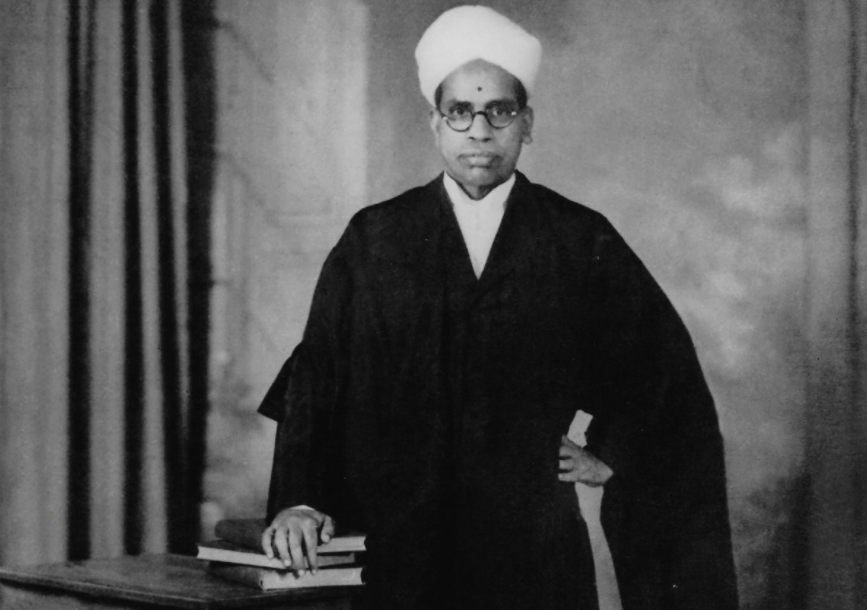
As stated above my grandfather was born in poverty in “Pudur”. After having spent a lifetime in “Pourohityam his father Ekamra Sastry, had planned to retire from his profession, and spend his days in peace and religious pursuits However he got an intuition, that someday his son would become famous and wealthy . Therefore he migrated from Pudur to Madras city along with his family with the idea of giving my grandfather the best education, he could afford.
After completion of his studies at school with distinction young Alladi, moved from the Church of Scotland Mission, and joined the Madras Christian College which was then in the heyday of its fame and prosperity.
In 1903 he appeared for the B.A examination and obtained a First class, degree.
He impressed enlightened professors like Kellett, Skinner and Miller so much that after graduation, he was appointed as a tutor in history. He won the admiration and affection of students as well as the professors. While as a tutor he studied law in his spare time. He passed the BL exam at the Madras Law College.
He decided to take up a career in law, though most people in his position would have hesitated to do so, having regard to the risk involved, and would have preferred to take up a steady job with a regular income. However, he boldly ventured into a field in which failures were many and successes very few- a measure of his confidence and courage, even at such an early stage in his life.
His disadvantages were many. He had no money, no influential social connections, and no helpful patron.
Lady luck shone on him soon, and the great lawyer Sunderam Iyer took him as an apprentice. Alladi impressed him with his remarkable grasp of the law. My grandfather joined the bar in 1906-1907.
Referring to Alladi, Sudhish Pai in his book “Legends in law” states” it is said that at the beginning of his innings at the Bar, he could not afford any transport to go to hIs senior or the court. He would hang on to the back seat of the horse carriage and when the driver whipped the horse to make it gallop faster, the backlash would hit Sir Alladi who bore it silently”.
Alladi would study law in the most unlikely places, trams( as Randor Guy observed in his article” The tram was his study”), parks, and the marina beach. Alladi would store in his head all the important provisions in several laws and connected case laws( he had a habit of underling important sentences and writing remarks in the margins of passages in the books he studied). He could instantaneously recall them when an argument in court required. This was a remarkable talent no one else possessed, in India’s legal history!
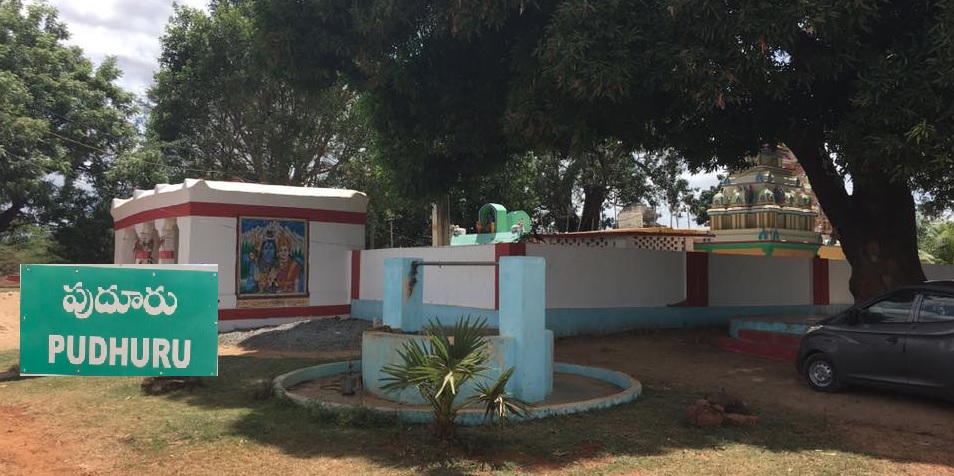
Alladi became the leader of the Madras bar in seven years, a position he retained throughout his life. His rise in the legal profession was meteoric, bordering on the romantic. He commanded respect throughout the erstwhile Madras presidency for his encyclopaedic knowledge of all branches of law. Sudhish Pai states that he bought a piece of land and built a palatial mansion, in 1919, with his entire savings, an indication of his ability and self- confidence. Recognition of his brilliance came to him in quick succession. In appreciation of his philanthropic and social services, he was awarded the Kaiser-i-Hind Medal in 1926. He became Advocate General of Madras in the year 1928. He continued to be in that position for seventeen years-the longest for any Advocate General in any State in the country. In 1930 he was awarded the title of Dewan Bahadur. In 1932 the honour of knighthood was conferred upon him in recognition of his genius and services to the State. He gave it up after independence.
Constitution of India is not only a beautiful document but a beautifully presented document too. Illustrations include Mohenjodaro period to Vedic and Epic periods to that of Maurya and Gupta Empire. pic.twitter.com/JIv4xspOnj
— Bar & Bench (@barandbench) January 26, 2018
In the summer of 1933, he went to England in connection with an appeal pending before the privy council. He met the leading figures in the legal world including the Lord Chancellor and the Attorney General, not to speak of reviving his old friendship with Sir John Power Wallis, who introduced him to all the members of the judicial committee. When he visited the Old Bailey, he was treated with great respect by the presiding judge, Justice Charles, who also entertained him to lunch. Sir Alladi also went to Cambridge and Oxford and met some of the most distinguished academic lawyers including Holdsworth.
Many of his juniors owe their rise in the profession to his influence and support. Some went on to become judges e.g Patanjali Sastri referred to above who became Chief Justice of the Supreme Court, N. Rajagopala Iyengar who became a Judge in the Supreme Court, and Seshachalapathi who became a judge in the Madras High Court. My grandfather himself did not like to sit on the Bench–as he felt that a career in the judiciary did not have the excitement, and challenge of advocacy.
On the other hand, Judges considered themselves lucky to sit on a bench when he was arguing a case.
Signature pages of the Constitution. We can see the signatures of the first President of India Dr. Rajendra Prasad and the First Prime Minister of India Pandit Nehru. pic.twitter.com/PwYDr7NJSX
— Bar & Bench (@barandbench) January 26, 2018
Sir Alladi was once appearing in a case in the Federal Court presided over by SirMaurice Gwyer the Chief Justice of India. He had finished his arguments by lunch. Sir John Simon, the famous British Barrister and later Lord Chancellor of England, was to visit the Court in the afternoon session and so during the lunch interval, the Chief Justice sent for Alladi and requested him to continue the arguments in the afternoon also as Sir John Simon wanted the visitor to listen to his arguments. Lord Simon was greatly impressed.
Again in Madras when Sir John Simon, during the same trip, visited the High Court, Chief Justice Lionel Leach requested Alladi to commence arguments, though the case in which Alladi was appearing was lower down in the cause list!
I had referred to the incident relating to Gwyer in an article penned by me in The Hindu, titled “Legal Luminary”, published in 2003 on the 50th death anniversary of my illustrious grandfather, whereas Sudhish Pai refers to both the above incidents in his book” Legends in law”
He also states that ” Alladi disliked and intolerant equally of both judges who frequently interrupted the arguments and also those who were silent and did not try to get their doubts cleared. He was at his best when a judge was alert and put relevant questions.”
Chief Justice Rajamannar in a matchless obituary reference said “Alladi Krishnaswami Iyer was supreme as an advocate. His advocacy was of the very highest order – powerful, selective, and vivid. He was never long-winded He never over-stated a case. But he was so powerful in his advocacy that if he had a strong point he presented it in such a way that the judges would feel that their reputation would be at stake if they decided against him.
In my article” Legal luminary” published in the Hindu, which I have referred to above I have narrated another incident relating to Chief Justice Leach,” my grandfather arguing before Justice Leach was expounding on some aspects of Hindu Law. At one stage, Justice Leach, in a tone that betrayed slight annoyance, questioned my grandfather whether it was really necessary to give him a lesson on the subject. Alladi reportedly shot back, “That is not my job today your Lordship. But as a piece of information, I might tell you that I have taught Hindu Law to six of your Lordship’s predecessors”. Alladi belonged to a genre of intellectuals of such moral integrity that they could use a barbed phrase or acidic retort without giving the slightest impression of insulting anyone”
To be continued …… Read Part 2 Here






























